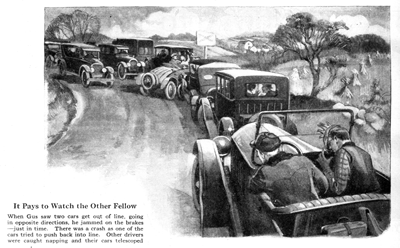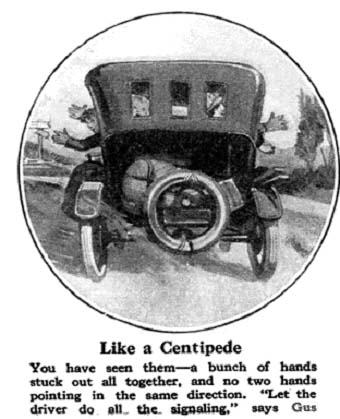Alphabetical List of Stories Monthly Illustration Galleries Index Links-All Stories
November 1925
WHEN FORESIGHT SAVES A CRASH
by Martin Bunn
Gus and Joe Go Hunting and Dodge Foolhardy Drivers

"DOGGONE!" exclaimed Gus Wilson, half owner and chief mechanic of the Model Garage, as he piloted his automobile to the rear of the line of cars that was creeping along toward the railroad crossing. "No matter how early in the morning a feller starts out, there's bound to be a bunch on the road ahead of him!"
Joe Clark, Gus's partner, the office man of the combination, settled himself a little more comfortably in the roomy front seat of Gus's ancient and honorable machine.
"Huh!" he grunted with a sly grin. "What do you expect on Election Day? Of course there'd be people on the roads. This isn't your private holiday."
"I know all about that," growled Gus. "But you'd think some of them would learn how to drive before they come out. Look at that dumb-bell down the line there. Wonder how he expects anybody to get past him, crowding in that way?"
"He's probably like you -- in a hurry to go rabbit shooting," suggested Joe teasingly. "The trouble with you hunting bugs is-- "
Joe got no further, for at that instant -- and apparently for no reason at all -- Gus jammed on the brakes so suddenly and so forcibly that his partner was caught unawares and almost catapulted through the windshield.
"Hey!" he protested, as he tried to regain his balance. "What in blazes are you trying to do?"
Before Gus had time to reply, there came a piercing scream and a grinding crash, followed immediately by a series of minor crashes as the cars ahead of the two garagemen telescoped into each other like a lot of freight-cars when a powerful locomotive takes up the slack in a train.
Gus's car had only a few feet behind the car in front, but by applying the brakes so suddenly. Gus had succeeded in dropping back a full 20 feet before the crash came, and now -- with locked wheels -- his car skidded to a halt without quite bumping the car ahead.
"Gosh!" panted Joe. "That was a close call. How did you know there was going to be a smash-up?"
"By keeping my eyes open," replied Gus a bit gruffly, as they joined the crowd of pale and nerve-shaken motorists who were standing about the damaged cars at the front of the line. Miraculously enough nobody had been injured seriously, in spite of the quantities of broken glass that had been flung in every direction.
The motorist who had caused the smash-up was surrounded by the owners of the cars that had piled up behind him, each one shouting angrily in an attempt to make himself heard above the hubbub.
Just as the argument seemed about to turn into a free-for-all fight, a motorcycle policeman appeared.
"Speaking of dumb drivers," said Gus, after the officer had restored quiet and the cars were moving again; "you remember that bird who pulled up along the line while we were waiting? Well, the road at the crossing is wide enough for three cars abreast, so the single file of cars coming the other way could get past. But when a fellow coming the other way tried to get out of line, that made four cars-and right then I slammed on the brakes. Our dumb-bell friend tried to get back into line when he saw the other car coming. But there wasn't any space to push into because the rear car could not drop back quick enough. They crashed and the drivers ahead were caught napping."
"Which only goes to show," said Joe, "that the right time to pass a car is something lots of drivers don't know."
"Humph!" Gus grunted. "There's more to it than that. The drivers of the cars that smashed into the wreck forgot the most important rule of the road. All they were thinking of was getting along in their own cars. What they should have done was to pay a lot more attention to what was likely to happen to the driver of the car ahead. Strong brakes are all right, but what good will they do you if you let yourself get caught where even locking all four wheels won't stop you in time?"
"But suppose you can't see what's going on beyond the car right in front of you?" demanded Joe.
"Then you should stay so far away from the car ahead that you'll have space to stop, no matter what happens. Look at that boob behind us," he directed, pointing to the reflecting mirror above his head. "If I stopped suddenly or even slowed down -- he'd ram me, sure as your name is Joe! He's not paying attention to his driving-he's admiring the scenery. It's fellows like him that cause most of the accidents -- if you ask me."
"When a man is driving a car, he ought to keep his mind on his job. And he can't do that if he insists on sight-seeing or turning around to talk to the people in the rear seat. I once saw a fellow run off a perfectly straight road and pile up in the ditch just because he insisted on talking to the passengers in the back. He was an old fellow and in his younger days he had driven a horse quite a lot. Horses stay on the road without being steered, and he couldn't get it in his head that an automobile wouldn't do likewise."
"The whole trouble is that so many drivers don't use any common sense in their driving. You can make all the traffic rules you want to, but they won't do much good unless the drivers of cars live up to 'em."
"That goes for special warning signals on the back of the car, too. What good are they if the man behind you doesn't pay attention? Most warning signals are set wrong anyway. The 'slow' or 'stop' sign flashes on the instant you press the brake pedal. They should be set so that the light will not flash until the brakes are actually applied hard enough to slow down the car. If warning signals were all set that way, then when an auto-driver saw a light flash on the rear end of the car ahead of him he would know that it meant business."
"You're dead right about warning signals," assented Joe. "But I thought they always were adjusted to light when the brakes went on?"
"They are when the car is new but when the brake linings wear a bit, the average owner doesn't bother to readjust the switch or the warning light. And as for hand signaling, just take a look it that flivver in front!"
"Gosh!" said Joe. "Looks just like a centipede on its back! I wonder what they are going to do?"
"One, two, three -- six hands out altogether and no two pointing in the same direction!" Gus growled disgustedly.
But in spite of all the hands, the flivver continued at a slow pace without swerving.
Gus jabbed the horn button viciously. The road was narrow and winding, and Gus did not want to have to go into the ditch to pass.
Immediately the hands began waving wildly and then the flivver groaned and chattered as the driver brought it to a halt squarely in the center of the road.
Gus waited a moment, assuming that something had gone wrong with the heavily loaded little car, but no one climbed out and voices raised in a wrangle floated back.
"Can you beat it!" exclaimed Gus angrily. "Stopping right in the center of the road while they argue about whether they are going in the right direction!"
Gus kept his finger on the horn button and it finally dawned on the driver of the flivver that his car was blocking the road.
"That's the trouble with hand signaling," said Joe. "Half the time you can't tell what the car ahead is going to do even when the driver does stick out his hand."
"Yes," said Gus, "and if any signaling is to he done, the driver is the one to do it. Nobody else in the car should stick out a hand under any circumstances. Lots of times I have jammed on the brakes because the fellow in front stuck out his hand unexpectedly in such a way that I thought he intended to make a left turn, and then after I had burned a lot of rubber on my tires, he turned off the road to the right. Fashions in hand signaling are changing all the time and, to make it worse, the proper signal for one locality may mean something else when you cross the state line. Some day we'll have a standard system of hand signals for the auto-driver that will be enforced all over the country. Meantime the only thing to do is to play safe, so that no matter what the signal means you will be able to avoid a smash-up."
"Seems to me," commented Joe, "that a lot of signaling is unnecessary."
"It sure is, and usually the better the driver the less signaling he has to do. If you keep on the right side of the road where you belong and make a turn into a road at the right, there's no reason why you should signal at all unless you have to slow down quite a bit to make the turn. Then if you make a habit of coasting to a stop and always slowing down as gradually as possible, the man behind doesn't need any signals."
"Well here we are at Turners Corners," Gus concluded, as they pulled up in front of a ramshackle building that housed the post office and general store.
They climbed out and Gus started to assemble his shotgun.
"There's just one sure rule for safety in auto-driving, Joe," Gus sagely observed, as he carefully fitted the barrels to the stock: "Know the rules of the road yourself and live up to them, but don't ever bank on the other fellow having any sense! Now for some good rabbit shooting!"
END
L. Osborne 2019
